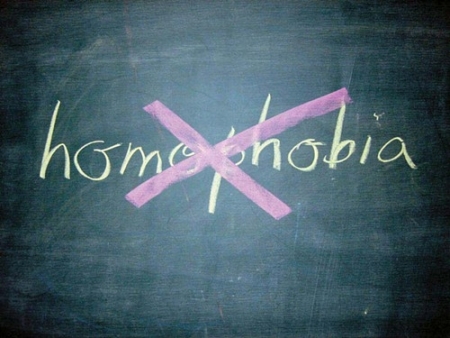In my capacity as managing editor for the Catholic channel (and also as the anointed “Mommabear of the New Homophiles”) I am seriously thinking about laying down a decree to Patheos’ Catholic bloggers that the word “homophobia” will no longer be used, unless it describes a truly “phobic” situation.
This comes after watching Pascal-Emmanuel Gobry’s piece on anti-gay laws in Uganda get waylaid — and made irrelevant — due to people, in comboxes and social media, landing on a variation of “homophobia” and getting stuck there. Readers fixate on the word and then immediately veer off into screeds on its inexactitude, its overuse and the way it acts as a cudgel to principled argument. One member of Facebook wrote, “use the word and I’m out of the conversation.”
Demanding that “exactly the right words be used in every circumstance or all conversation must end” foments a soft tyranny against dialogue — one that’s been seriously detrimental to our nation.
Yet, it seems to me that, beneath their anger, these folks do have a point. How many of us who harbor no “phobia” toward homosexual persons have nevertheless been called “homophobic” — and thus tainted with this often-baseless and recklessly misapplied shorthand for “hateful hater” — simply for suggesting that “tolerance” should be a two-way street, whereby religious consciences are afforded an equal allowance to “be who they are?”
. . .if we lose the ability to respect that people can only go as far as their consciences will allow, we risk becoming mired in a muck of illusion, imagining hate where none exists, equating compelled behavior with authentic love, and losing sight of the fact that traveling together sometimes means that we walk the extra mile on one challenging road, and they walk it on the next. Everyone spares a bit of shoe-leather for the sake of the other. This is how love travels.
It’s also how “tolerance” actually works, but only if the word itself is properly understood and not bastardized to mean “celebrate unreservedly”.
Just as “tolerance” is broadly mis-used, so is “homophobia” and the weight of the word has become a toxic barrier to real understanding. How does one make a case for either tolerance or a full absorption of one’s position if — by immediately using the word “homophobic” — you have made some feel defensive? I once had a very worked-up lesbian (who knew nothing at all about me beyond that I believe churches should be protected from coercion on gay marriage) call me a “bullying homophobe”, and — protected by her Linguistic Shield of Righteousness — she felt justified in ignoring or distorting my words. Her cries of “Bullying Homophobe” meant my argument was moot. Engagement was pointless, because one of us was not debating in good faith.
So, “homophobia” is inexact; it is divisive; it is over-used. Most troublingly for a thoughtful writer, it is a word whose use risks an idea going unread — often by an audience that most needs to ponder it — or getting so bogged-down in ideological cant that its point is lost.
Henceforth, I wonder if people forging good-faith discussions will agree that “homophobia/homophobic/homophobe” are words that must be limited in use and employed only when doing so will invite neither confusion or slander, because the subject of a piece is known to be authentically driven by “phobia”. Writers could be encouraged to bypass the easy shorthand for more arduous (but more exact) phrases, such as “persecution of homosexuals” or “anti-gay” both of which are perfectly suited to this blog post:
This morning, a rally was held in Uganda to celebrate that country’s new and notoriously harsh anti-gay legislation. I was greatly distressed when I found out that the Catholic archbishop of Kampala, Cyprian Kizito Lwanga, had participated.
I find this absolutely unconscionable. This should be so easy. A law that punishes homosexual acts with sentences up to life imprisonment, and punishes non-reporting with prison, is plainly unjust and against the Gospel and the Church’s Holy Magisterium.
Exactly so. And Gobry is exactly right that the church must have a clear, unified voice on issues such as these. In the past Lwanga has argued against this law as being “at odds with the core values”, so let us hope for some clarity on his position and participation in this matter.
Clarity of meaning is not just important, it is necessary for justice.
Words have meanings, too, and the ways in which we use them to bring light or to obfuscate also feed what is just and unjust. “Homophobia” (and all of that word’s variants) seems to me to be a word which over-generalizes, blurs distinctions and too-often halts conversations before they even begin. It is one more word used to label people and instantly negate them — to justify a turn away from charitable discourse, silence the timid, and keep our society stalled, bickering and distrustful and hopelessly divided.
There have to be other, better, words out there. What might they be?
And how do we protect their meanings from being distorted or their use misappropriated, so we do not, in a few years, have to revisit the question?
Comments have been closed for Lent, but my question necessitates them being opened, just this once. What are you suggestions? (I will be monitoring so answer seriously or don’t bother.)
Homo-disto? (to stand apart)
Homo-tracta? (to ponder)
Homo-cerno? (to distinguish, to reckon)












